Late Victorian Eschatology (6 vols.)
Digital Logos Edition
Overview
With all that the Bible has to say about eternity, much is still left to question. What actually happens when we die? Over 130 years ago, Frederic William Farrar presented a series of sermons that sparked one of the greatest eschatological debates in Christian literature. Before Farrar published Eternal Hope, thousands of copies of the sermons contained within it had been publicly distributed without his knowledge. Farrar’s ideas were wildly popular with the masses, and intensely debated in scholarly circles. Farrar used a focused study of Scripture to redefine what modern Christianity had thought to be hell. E. B. Pusey challenged Farrar’s ideas in his book, What Is of Faith As to Everlasting Punishment?
Late Victorian Eschatology brings together six intimately related texts discussing heaven, hell, and what happens on the other side of death. Mercy and Judgment is Farrar’s rebuttal to Pusey’s argument, and Thoughts on Immortality is J. C. Ryle’s contribution to eschatology and his own remarks on Eternal Hope. The Unsafe Anchor is C. F. Childe’s review of Eternal Hope, and Robert Baker Girdlestone provides a fresh eschatological examination of Scripture with Dies Iræ.
With the Logos edition of Late Victorian Eschatology, these fascinating writings automatically integrate with your Logos library, allowing you to cross-reference them and study eschatology like never before. All references to Scripture are tagged and appear in your favorite translation on mouseover.

Key Features
- Interrelated texts debating eschatological issues from multiple perspectives
- Five sermons that sparked intense intellectual engagement
- Detailed references to Scripture and other texts
Product Details
- Title: Late Victorian Eschatology
- Authors: Frederic William Farrar, E. B. Pusey, J. C. Ryle, C. F. Childe, and Robert Baker Girdlestone
- Volumes: 6
- Pages: 1,192
Individual Titles
- Eternal Hope by Frederic William Farrar
- What Is of Faith As to Everlasting Punishment? by E. B. Pusey
- Mercy and Judgment by Frederic William Farrar
- Thoughts on Immortality by J. C. Ryle
- The Unsafe Anchor: “Eternal Hope” a False Hope by C. F. Childe
- Dies Iræ by Robert Baker Girdlestone
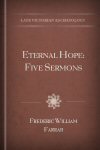
This book contains F. W. Farrar’s five wildly popular sermons, “What Heaven Is,” “‘Hell’—What It Is Not,” “Earthly and Future Consequences of Sin,” “Is Life Worth Living?” and “Are There Few That Be Saved?”
Frederic William Farrar (1831–1903) was born in Bombay, India. He attended King’s College in London and Trinity College, Cambridge. Farrar was canon of Westminster and later rector of St. Margaret’s, Westminster. Later he became the archdeacon of Westminster Abbey and dean of Canterbury. Known for his preaching, Farrar was also a prolific author. His works include The Life and Work of St. Paul, The Life of Christ, and Lives of the Fathers, Great Books, The Bible: Its meaning and Supremacy, The Early Days of Christianity, as well as novels and children’s books.
[Farrar] was at that time the most popular preacher and writer in the Church of England . . . but was guilty of one great sin in the eyes of many literary critics—he had the gift of expressing his knowledge in such a way as to appeal to the multitude.
—Sir Henry S. Lunn, humanitarian, missionary, and founder of Lunn Poly
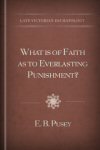
What Is of Faith As to Everlasting Punishment?
- Author: E. B. Pusey
- Publisher: James Parker & Co.
- Publication Date: 1881
- Pages: 290
This book is E. B. Pusey’s response to Eternal Hope.
Edward Bouverie Pusey (1800–1882) was a leader in the Anglo–Catholic Oxford movement, also known as the Tractarian movement, and for more than 50 years he served as Regius Professor of Hebrew and canon of Christ Church at Oxford. With other brilliant young Oxford conservatives, he shared a concern about the rising tide of biblical and theological liberalism and the reform spirit rampant in Britain during the late 1820s and the 1830s. This concern led him to play an active role in nearly every important theological and academic controversy. Pusey’s name became synonymous with the Oxford movement.
[Pusey’s] volume is, in many respects, the best that has thus far appeared; it is strong, and yet tender in its teachings; and there runs all through it such a loving feeling, it breathes such a gentle compassion toward sinners, it manifests such a strong ‘hope’ of salvation in each individual case, reaching to even the worst of men, that it will seem to all its readers the very echo of the Gospel itself.
—The Churchman
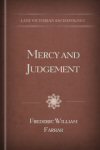
Mercy and Judgment
- Author: Frederic William Farrar
- Publisher: E. P. Dutton & Co.
- Publication Date: 1881
- Pages: 485
This book is Farrar’s response to Pusey’s What Is of Faith As to Everlasting Punishment? and other criticisms of the beliefs expressed in Eternal Hope.
Frederic William Farrar (1831–1903) was born in Bombay, India. He attended King’s College in London and Trinity College, Cambridge. Farrar was canon of Westminster and later rector of St. Margaret’s, Westminster. Later he became the archdeacon of Westminster Abbey and dean of Canterbury. Known for his preaching, Farrar was also a prolific author. His works include The Life and Work of St. Paul, The Life of Christ, and Lives of the Fathers, Great Books, The Bible: Its meaning and Supremacy, The Early Days of Christianity, as well as novels and children’s books.
This present volume takes the form of an answer to Dr. Pusey, and the result is that the two doctors of divinity, though representing entirely different, not to say antagonistic, theologies, are apparently more agreed than at first sight could have been expected.
—The Modern Review, a Quarterly Magazine
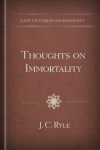
Thoughts on Immortality
- Author: J. C. Ryle
- Publisher: William Hunt and Company
- Publication Date: 1883
- Pages: 80
J. C. Ryle wrote this book after having preached at length on the subject of eternity, and studied Farrar’s Eternal Hope. Ryle advocates for a more complete view of God’s character, challenges the gaps in Farrar’s reasoning, and brings to light his own understanding of eternity.
John Charles Ryle (1816–1900) was educated at Christ Church, Oxford, where he was a Craven scholar. He was ordained in 1841 and became a leader of the evangelical party in the Church of England. In 1880, Ryle became the first bishop of Liverpool and also served as the dean of Salisbury. Ryle remained the bishop of Liverpool for 20 years. He was noted for his doctrinal essays and polemical writings. His bestselling titles include Expository Thoughts on Mark and Holiness: Its Nature, Hindrances, Difficulties and Roots which can both be found in the J. C. Ryle Collection (18 vols.). He also contributed three volumes in the Crossway Classic Commentary Collection (13 vols.).
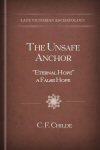
The Unsafe Anchor: “Eternal Hope” a False Hope
- Author: C. F. Childe
- Publisher: William Hunt and Company
- Publication Date: 1879
- Pages: 133
This text was originally written as a review of Farrar’s Eternal Hope, but through the editing and publication process it became an entire volume on the subject. It is one of the four eschatological texts about which J. C. Ryles once said, “No one of these books has ever been answered, and I venture to think they never will be.”
Reverend Charles Frederick Childe (1807–1897) was the principal of Church Missionary College in Islington from 1830 until 1858, when he became the rector of Holbrook in Suffolk. He authored David’s Conduct in Affliction, and Glad Tidings: A Sermon.
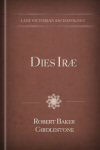
Dies Iræ
- Author: Robert Baker Girdlestone
- Publisher: William Hunt and Company
- Publication Date: 1869
- Pages: 284
Girdlestone wrote this book using the same notion of pure treatment of Scripture to explore eschatology that Farrar used in Eternal Hope, but with an entirely different conclusion.
Robert Baker Girdlestone (1836–1923) was an Anglican minister at St. John’s in Downshire Hill, Hampstead. He was a Hebrew scholar and head of the translation department of the British and Foreign Bible Society who studied at Charterhouse in London and Christ Church, Oxford. He also wrote Synonyms of the Old Testament.
Reviews
2 ratings
youngsoo hwang
4/27/2016
I bought "Late Victorian Eschatology" As your instruction, I reopened my Logos Bible Softwar, However, I could'nt find it. What I did wrong?AeliusCicero
6/19/2014

Larry Proffitt (I
5/29/2014